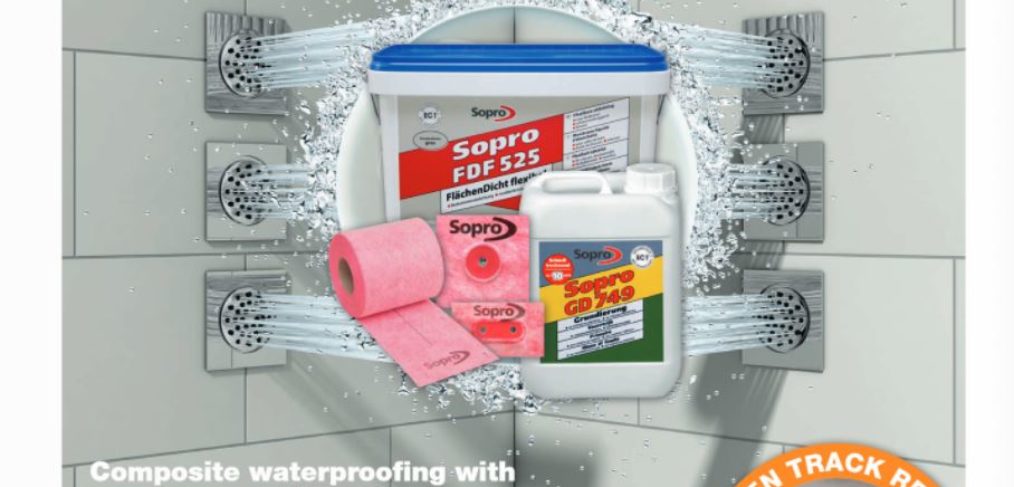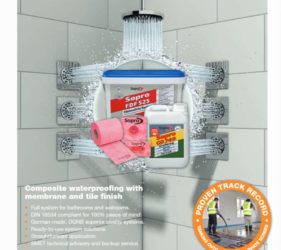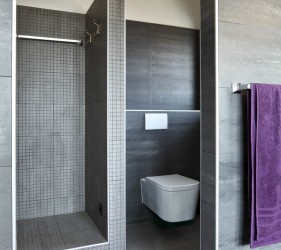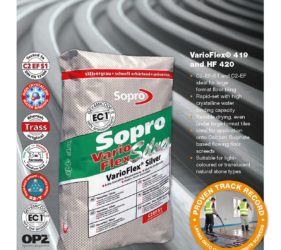
Masters of Tiling: European standards for adhesives EN 12004 | SMET feature in Northern Builder
It is important to be aware of performance criteria of tile adhesives and how they relate to your choice of product.
JORIS SMET of SMET BUILDING PRODUCTS LTD PROVIDES ADVICE AND GUIDANCE FOR PROFESSIONAL TILING…
Adhesive products used for laying ceramic tiles are required to meet various performance standards. These are precisely defined in European standard EN 12004 (or ISO 13 007 Part 1), which specifies the criteria for the C1 and C2 ratings (for cementitious adhesives), D1 and D2 ratings (for dispersion adhesives) and R1 and R2 (for reaction resin adhesives) along with extra optional parameters. Standard EN 12004 sets out the background to the S1 and S2 ratings for cementitious adhesives.
It is important to be aware of performance criteria of adhesives and how they relate to your choice of product.
CEMENTITIOUS ADHESIVES
Tensile adhesion strength – The C1 and C2 ratings (specified in EN 12004) relate to tensile adhesion performance. The Class C1 criteria represent the minimum requirements (min. 0.5 N/ mm²) for all cementitious tile adhesives. The performance standards specified for Class C2 are appreciably higher, with a minimum tensile adhesion strength of 1 N/mm² required of thin-bed adhesives. Tensile adhesion tests for the C1 and C2 ratings are performed for four different storage conditions. For rapid setting tile adhesives, an early tensile adhesion strength of 0.5N/mm2 is requested after 6 hours.
Deformability – The deformability of hardened, cementitious thin-bed adhesives is tested using a predefined specimen (strip of material) and rated as S1 or S2 (to EN 12004). While the S1 rating requires a deformability between a minimum of 2.5mm and 5mm, Class S2 is reserved for highly deformable products achieving a minimum value of 5mm – a requirement twice that specified by the German Flexmortar guidelines.
DISPERSION ADHESIVES
The D1 and D2 ratings (specified in EN 12004) relate to shear strength. All dispersion adhesives are required to meet at least Class D1 requirements, i.e. by exhibiting min. 1 N/mm² shear strength after dry and heat storage. The D2 rating additionally requires a minimum shear strength of 0.5 N/mm² after water storage together with a shear strength – 1 N/mm² at elevated temperatures.
REACTION RESIN ADHESIVES
Like the D1 and D2 ratings for dispersion adhesives, Classes R1 and R2 for reaction resin adhesives (specified in EN 12004) relate to shear strength. All reaction resin adhesives are required to meet at least Class R1 requirements, i.e. by exhibiting min. 2 N/mm² shear strength after dry and water storage. The R2 rating additionally requires a minimum shear strength of 2 N/mm² after temperature cycles.
SMET GUIDELINES FOR TILING ONTO CALCIUM SULPHATE SCREED
It is imperative the correct tile adhesive is used when installing large format floor tiles. The type and size of the tile or stone used determines the type of adhesive required.
Floor Screeds in bathrooms and wetrooms must always be tanked, without exception, prior to installing tiles. SMET recommends the following high crystalline water binding adhesives in combination with an acrylic primer for a successful and trouble-free installation of large format (>0.2m²) tiles.
For natural stone, terracotta, glass, resin- and cement-bonded tiles, always consult the SMET Technical team.
FLOOR TILING TO BS 5385-3 CERAMIC TILES
When the floor screed is dry (and moisture content is confirmed by conducting a moisture test), ensure the floor screed is clean, laitance free, free of dust, grease, paint, or any other impurities that may prevent adhesion.
- Prime the floor screed using Sopro GD 749 acrylic primer as directed, ensuring the screed is fully sealed by proper film formation.
- Use Sopro VarioFlex® HF 420 or Sopro Varioflex® Silver 419 tile adhesive. Always use the butter and float method. This ensures 100% adhesive coverage of the large format tile by applying a contact layer of adhesive on the back of the tile – followed by placement of the tile into a prepared combed adhesive bed using a 10mm serrated trowel. Note – movement joints in the screed should always be followed through with a movement joint in the tiles. A proprietary movement joint or soft (silicone) joint should be used.
- Use Sopro DF 10 Designer Flexible Tile Grout for tile 1-10mm joints, ensuring brilliantly coloured joints with a lasting appeal.
Smet Building Products Ltd is the agent for German-made, superior quality Sopro Professional Tiling Systems which all meet the EU standards requirements without exception. If you would like to discuss your floor project, get in touch with the substrate experts at SMET.
Smet Building Products Ltd demonstrates, once again, best practice in supporting its Smet Supported Partners through offering a comprehensive range of professional render systems backed up with a superior level of technical know-how.



